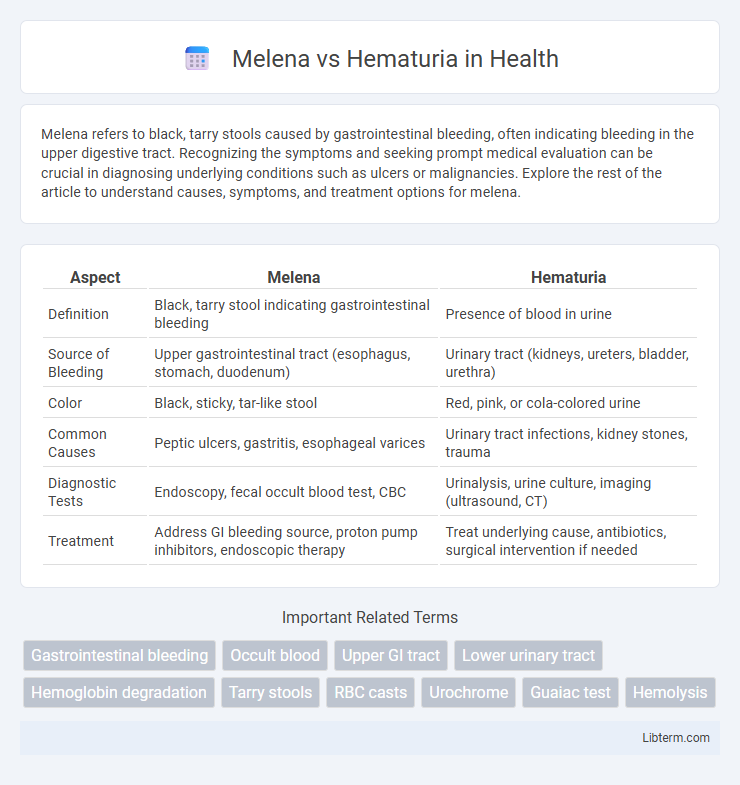Melena refers to black, tarry stools caused by gastrointestinal bleeding, often indicating bleeding in the upper digestive tract. Recognizing the symptoms and seeking prompt medical evaluation can be crucial in diagnosing underlying conditions such as ulcers or malignancies. Explore the rest of the article to understand causes, symptoms, and treatment options for melena.
Table of Comparison
| Aspect | Melena | Hematuria |
|---|---|---|
| Definition | Black, tarry stool indicating gastrointestinal bleeding | Presence of blood in urine |
| Source of Bleeding | Upper gastrointestinal tract (esophagus, stomach, duodenum) | Urinary tract (kidneys, ureters, bladder, urethra) |
| Color | Black, sticky, tar-like stool | Red, pink, or cola-colored urine |
| Common Causes | Peptic ulcers, gastritis, esophageal varices | Urinary tract infections, kidney stones, trauma |
| Diagnostic Tests | Endoscopy, fecal occult blood test, CBC | Urinalysis, urine culture, imaging (ultrasound, CT) |
| Treatment | Address GI bleeding source, proton pump inhibitors, endoscopic therapy | Treat underlying cause, antibiotics, surgical intervention if needed |
Introduction to Melena and Hematuria
Melena refers to black, tarry stools caused by upper gastrointestinal bleeding, often indicating bleeding in the stomach or duodenum. Hematuria is the presence of blood in the urine, signaling potential issues in the kidneys, ureters, bladder, or urethra. Differentiating between melena and hematuria is crucial for accurate diagnosis and treatment of the underlying condition.
Definition and Key Differences
Melena refers to the passage of black, tarry stools caused by upper gastrointestinal bleeding, whereas hematuria is the presence of blood in the urine, indicating bleeding within the urinary tract. Key differences include the source of bleeding--gastrointestinal tract for melena and urinary system for hematuria--and the appearance, with melena characterized by dark stools and hematuria by red or pink-colored urine. Diagnostic evaluation involves endoscopy for melena and urinalysis or cystoscopy for hematuria to determine the underlying cause.
Common Causes of Melena
Melena typically results from upper gastrointestinal bleeding sources such as peptic ulcers, gastritis, or esophageal varices, causing black, tarry stools due to digested blood. In contrast, hematuria involves blood in the urine often stemming from urinary tract infections, kidney stones, or bladder cancer. Identifying melena's underlying causes requires evaluation through endoscopy, as these conditions reflect bleeding proximal to the ligament of Treitz.
Common Causes of Hematuria
Hematuria, or blood in the urine, commonly results from urinary tract infections, kidney stones, enlarged prostate, and cancer of the bladder or kidneys. In contrast, melena refers to black, tarry stools indicating upper gastrointestinal bleeding, typically from peptic ulcers or gastritis. Recognizing these distinct causes aids in accurate diagnosis and effective treatment plans.
Clinical Presentation and Symptoms
Melena is characterized by black, tarry stools resulting from upper gastrointestinal bleeding, often accompanied by symptoms such as abdominal pain, weakness, and anemia. Hematuria presents as visible blood in the urine or microscopic blood detected on urinalysis, frequently associated with urinary frequency, dysuria, and flank pain. Both conditions signal internal bleeding but differ in origin: melena indicates gastrointestinal tract involvement, while hematuria points to urinary tract or renal pathology.
Diagnostic Approaches
Melena diagnosis primarily involves upper gastrointestinal endoscopy to identify bleeding sources in the stomach or duodenum, supported by fecal occult blood tests and laboratory evaluations of hemoglobin levels. Hematuria diagnostic approaches include urinalysis to detect red blood cells, imaging techniques such as ultrasound or CT urography to assess the urinary tract, and cystoscopy for direct bladder visualization. Both conditions require differentiation through targeted clinical history, laboratory results, and specialized imaging to determine the origin of bleeding accurately.
Laboratory and Imaging Studies
Melena is diagnosed through stool guaiac tests indicating the presence of digested blood, while hematuria is detected by urinalysis revealing red blood cells in urine. Imaging studies for melena often include upper gastrointestinal endoscopy and abdominal CT angiography to locate bleeding sources, whereas hematuria evaluation involves renal ultrasound and CT urography to identify urinary tract abnormalities. Laboratory assessments for melena emphasize hemoglobin levels and coagulation profiles, whereas hematuria workup focuses on kidney function tests and urine cytology.
Treatment Options for Melena
Treatment options for melena primarily focus on addressing the underlying cause of gastrointestinal bleeding, such as peptic ulcers or gastric erosions. Endoscopic interventions, including cauterization, clipping, or injection therapy, are commonly employed to control active bleeding, while proton pump inhibitors (PPIs) help reduce gastric acid secretion and promote healing. In severe cases, blood transfusions and surgery may be necessary to stabilize the patient and stop the hemorrhage.
Treatment Options for Hematuria
Treatment options for hematuria depend on the underlying cause, ranging from antibiotics for urinary tract infections to surgical interventions for kidney stones or tumors. In cases of benign prostatic hyperplasia, medications such as alpha-blockers or 5-alpha-reductase inhibitors may be prescribed to reduce urinary bleeding. Persistent hematuria without an identifiable cause often requires further diagnostic evaluation and may involve minimally invasive procedures or biopsy for definitive management.
When to Seek Medical Attention
Seek medical attention immediately if melena, characterized by black, tarry stools indicating upper gastrointestinal bleeding, occurs alongside symptoms like dizziness, rapid heartbeat, or severe abdominal pain. Hematuria, the presence of blood in urine, requires urgent evaluation if accompanied by pain, fever, or difficulty urinating, as it may signal serious conditions such as urinary tract infections, kidney stones, or malignancies. Persistent or heavy bleeding, regardless of type, necessitates prompt professional assessment to prevent complications and ensure accurate diagnosis and treatment.
Melena Infographic

 libterm.com
libterm.com